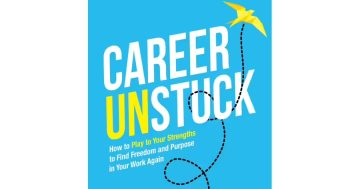Nicole Singh* says that if you’re thinking of embarking on a career change, there are some pragmatic measures you should take before handing in your resignation.
 Millennials are known for seeking careers that are meaningful to them, ditching the notion that work is simply just a means to bring home a pay cheque.
Millennials are known for seeking careers that are meaningful to them, ditching the notion that work is simply just a means to bring home a pay cheque.
In fact, a recent study by job-seeking website SEEK proves that Australians want to be fulfilled beyond finance, with 60 per cent of professionals feeling “stuck” in their career, hoping that they can one day pursue a different job.
But while finding a career that meets all your values and goals is the ideal scenario, handing in your resignation letter and then figuring out how to achieve the dream role isn’t always the most practical plan of attack — because let’s be honest, sometimes pursuing your dreams can take a while, and often, comes with its own set of downfalls.
So, if you’re thinking of embarking on a career change, we’ve enlisted the help of psychologist Sabina Read for some practical advice on changing careers, and navigating the switch in the most pragmatic way possible.
Start with a goal-oriented approach
If you’ve recently discovered that you don’t want to pursue your career any longer, Read suggests keeping a positive framework in check, in order to make the process of a career change as productive as possible.
“Fear of the unknown is a common factor holding many people back from changing careers, especially in later life,” she says.
“A goal-oriented approach which focuses on what you are moving towards, as opposed to what you’re avoiding or moving away from, can help us ride the wave of discomfort that uncertainty brings, while also moving us closer to pursuing a new role filled with passion and purpose.”
Allocate some time to evaluating your new career path
Before pursuing a new career path, Read points out that we can tend to idealise the reality of what a new career will look like, and suggests taking time to assess your core values and strengths, while thinking about how these will align with your new venture.
“Stay away from thinking in absolutes,” she says.
“There is no perfect job, and it’s unlikely that one job will tick all the right boxes.”
“So, at every stage of life it’s important to take stock and consider how a new career aligns with your values, natural strengths, and transferable skills.”
“Take comfort in knowing that no employment experience is wasted, and each job has the potential to inform and enhance future roles.”
“All too often we shine the light on the skills we don’t have or the gaps in our résumé, however, focusing on our existing strengths and aptitudes can enhance our self-belief and help move us closer to a fulfilling role or change in direction.”
Identify the first key steps you need to take
Perhaps the reason so many don’t pursue the career they want is due to the overwhelming nature of taking a big risk.
But Read thinks that this doesn’t always need to be the case, instead suggesting looking at ways you can take small steps while in your current role.
“Pursuing a career change doesn’t necessarily require an immediate or extreme change,” she says.
“Career transitions don’t always follow a neat linear path, and sometimes small incremental steps towards our dream job can honour our passions and increase self-confidence while simultaneously moving us closer to our end goal, all while we continue to pay bills and juggle other pressures that life throws at us.”
“At the end of the day, change requires action, so identify what initial steps you can make today including volunteering, retraining, or even massaging the parameters of your current role.”
* Nicole Singh is a writer and producer at Allure Media in Sydney.
This article first appeared at www.mydomainehome.com.au.











